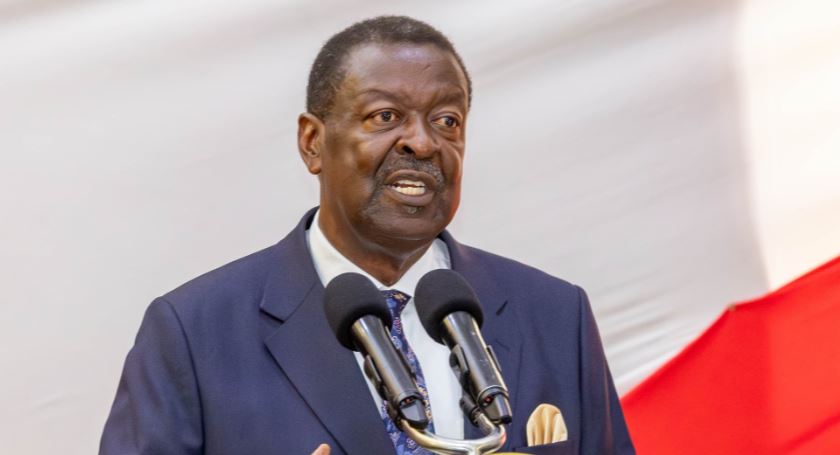
 Prime Cabinet Secretary and Foreign Affairs Cabinet Secretary Musalia Mudavadi/HANDOUT
Prime Cabinet Secretary and Foreign Affairs Cabinet Secretary Musalia Mudavadi/HANDOUT
The Ministry of Foreign and Diaspora Affairs has handled 3,452 distress cases involving Kenyan workers in the Middle East since 2023, Prime Cabinet Secretary and Foreign Affairs Cabinet Secretary Musalia Mudavadi has told Parliament.
Mudavadi made the disclosure while responding to questions from Samburu West MP Naisula Lesuuda, who sought clarification on government interventions to protect Kenyans seeking employment in Gulf countries.
He said the rising number of Kenyans taking up jobs abroad, particularly in Saudi Arabia, has increased the pressure on Kenya’s foreign missions.
“The number of Kenyans living and working in the Kingdom of Saudi Arabia has increased exponentially, now estimated at 350,000,” he said.
To improve the government’s ability to respond to distress cases, Mudavadi said Kenya recently opened a consulate in Jeddah to support the Embassy in Riyadh.
“We will also be seeking more budgetary support to expand the capacity of our mission to serve Kenyans better. The government will be seeking funding for the establishment of a safe house for Kenyans in distress,” he added.
Lesuuda had asked for details on staffing, funding, safe-house availability, and case-resolution timelines at the two missions.
She also questioned the integrity of recruitment processes and wage agreements affecting Kenya’s migrant workers in Saudi Arabia.
Mudavadi dismissed claims that senior government officials or their relatives have interests in companies involved in recruiting Kenyans to the Gulf.
“Kenyans migrating abroad must have a travel insurance cover. No single insurance company has a monopoly covering Kenyans seeking jobs in the Gulf. Individuals and Kenyan private recruitment agencies are at liberty to choose their preferred insurance company,” he said.
On the status of Kenya’s bilateral labour agreement with Saudi Arabia, Mudavadi said talks for a more comprehensive framework are underway.
He revealed that negotiations are at an advanced stage and will cover both skilled and semi-skilled workers.
“Just this week, we have received official communication on enhanced wage agreements for Kenyans employed in the Kingdom of Saudi Arabia,” he said.
He also explained that the current minimum wage structure for domestic workers was set during a February 2019 meeting between Saudi manpower companies and Kenyan recruitment agencies, where both sides agreed on a minimum salary of 850 Saudi Riyals.
Mudavadi said Saudi Arabia has since introduced reforms to strengthen worker protections, including the recent rollout of Phase Three of its Wage Protection System (WPS).
“From 1 October 2025, Saudi Arabia officially launched Phase 3 of its Wage Protection System (WPS) for domestic workers. Under this phase, all employers who hire two or more domestic workers are now required to transfer salaries through official digital channels via MUSANED,” he said.
By January 2026, this digital payment system will become mandatory for all domestic workers in the kingdom. Mudavadi described the WPS as a “landmark reform” that strengthens protection, promotes fair treatment and enhances trust between workers, employers and recruitment offices.
On recruitment oversight, Mudavadi said all agencies undergo thorough vetting by a Multi-Agency Committee.
“The committee vets all applications by recruitment agencies in line with Section 54A to 60 of the Labour Institutions Act 2007 and the Private Employment Agencies Regulations of 2016,” he said.
The criteria include a capital base of Sh5 million, office facilities, educational qualifications of directors and managers, and proof of a clean criminal record.
“There are currently 594 recruitment agencies with valid licenses. The government has deregistered over 600 other agencies on various grounds of malpractises,” he said.
Mudavadi concluded by defending Kenyan workers abroad as globally sought-after.
“Our citizens are not merely migrating for work; they are being actively recruited worldwide because of their skills, resilience, and work ethic,” he said.
He added that the government will continue strengthening protections so that “every Kenyan who steps out to earn abroad does so with the full backing and shield of their government.”


















